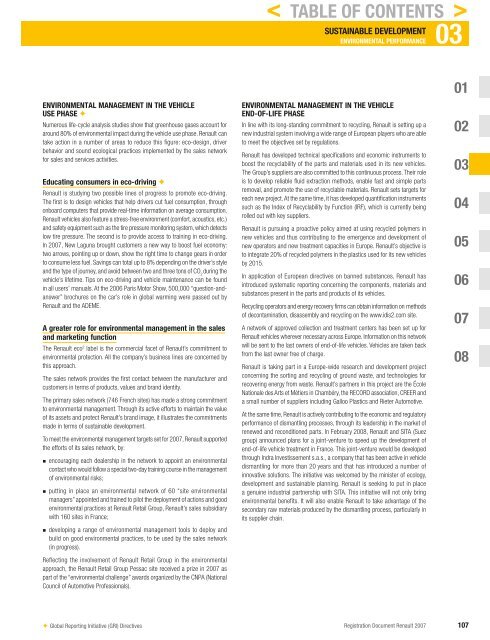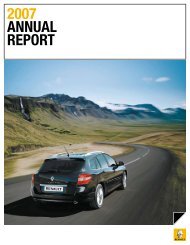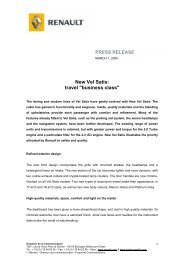2007 Interactive Registration Document - Renault
2007 Interactive Registration Document - Renault
2007 Interactive Registration Document - Renault
You also want an ePaper? Increase the reach of your titles
YUMPU automatically turns print PDFs into web optimized ePapers that Google loves.
ENVIRONMENTAL MANAGEMENT IN THE VEHICLE<br />
USE PHASE ✦<br />
Numerous life-cycle analysis studies show that greenhouse gases account for<br />
around 80% of environmental impact during the vehicle use phase. <strong>Renault</strong> can<br />
take action in a number of areas to reduce this fi gure: eco-design, driver<br />
behavior and sound ecological practices implemented by the sales network<br />
for sales and services activities.<br />
Educating consumers in eco-driving ✦<br />
<strong>Renault</strong> is studying two possible lines of progress to promote eco-driving.<br />
The fi rst is to design vehicles that help drivers cut fuel consumption, through<br />
onboard computers that provide real-time information on average consumption.<br />
<strong>Renault</strong> vehicles also feature a stress-free environment (comfort, acoustics, etc.)<br />
and safety equipment such as the tire pressure monitoring system, which detects<br />
low tire pressure. The second is to provide access to training in eco-driving.<br />
In <strong>2007</strong>, New Laguna brought customers a new way to boost fuel economy:<br />
two arrows, pointing up or down, show the right time to change gears in order<br />
to consume less fuel. Savings can total up to 8% depending on the driver’s style<br />
and the type of journey, and avoid between two and three tons of CO during the<br />
2<br />
vehicle’s lifetime. Tips on eco-driving and vehicle maintenance can be found<br />
in all users’ manuals. At the 2006 Paris Motor Show, 500,000 “question-andanswer”<br />
brochures on the car’s role in global warming were passed out by<br />
<strong>Renault</strong> and the ADEME.<br />
A greater role for environmental management in the sales<br />
and marketing function<br />
The <strong>Renault</strong> eco2 label is the commercial facet of <strong>Renault</strong>’s commitment to<br />
environmental protection. All the company’s business lines are concerned by<br />
this approach.<br />
The sales network provides the fi rst contact between the manufacturer and<br />
customers in terms of products, values and brand identity.<br />
The primary sales network (746 French sites) has made a strong commitment<br />
to environmental management. Through its active efforts to maintain the value<br />
of its assets and protect <strong>Renault</strong>’s brand image, it illustrates the commitments<br />
made in terms of sustainable development.<br />
To meet the environmental management targets set for <strong>2007</strong>, <strong>Renault</strong> supported<br />
the efforts of its sales network, by:<br />
n<br />
n<br />
n<br />
encouraging each dealership in the network to appoint an environmental<br />
contact who would follow a special two-day training course in the management<br />
of environmental risks;<br />
putting in place an environmental network of 60 “site environmental<br />
managers” appointed and trained to pilot the deployment of actions and good<br />
environmental practices at <strong>Renault</strong> Retail Group, <strong>Renault</strong>’s sales subsidiary<br />
with 160 sites in France;<br />
developing a range of environmental management tools to deploy and<br />
build on good environmental practices, to be used by the sales network<br />
(in progress).<br />
Reflecting the involvement of <strong>Renault</strong> Retail Group in the environmental<br />
approach, the <strong>Renault</strong> Retail Group Pessac site received a prize in <strong>2007</strong> as<br />
part of the “environmental challenge” awards organized by the CNPA (N ational<br />
C ouncil of Automotive P rofessionals).<br />
✦ Global Reporting Initiative (GRI) Directives<br />
< TABLE OF CONTENTS ><br />
SUSTAINABLE DEVELOPMENT 03<br />
ENVIRONMENTAL PERFORMANCE<br />
ENVIRONMENTAL MANAGEMENT IN THE VEHICLE<br />
END-OF-LIFE PHASE<br />
In line with its long-standing commitment to recycling, <strong>Renault</strong> is setting up a<br />
new industrial system involving a wide range of European players who are able<br />
to meet the objectives set by regulations.<br />
<strong>Renault</strong> has developed technical specifi cations and economic instruments to<br />
boost the recyclability of the parts and materials used in its new vehicles.<br />
The Group’s suppliers are also committed to this continuous process. Their role<br />
is to develop reliable fl uid extraction methods, enable fast and simple parts<br />
removal, and promote the use of recyclable materials. <strong>Renault</strong> sets targets for<br />
each new project. At the same time, it has developed quantifi cation instruments<br />
such as the Index of Recyclability by Function (IRF), which is currently being<br />
rolled out with key suppliers.<br />
<strong>Renault</strong> is pursuing a proactive policy aimed at using recycled polymers in<br />
new vehicles and thus contributing to the emergence and development of<br />
new operators and new treatment capacities in Europe. <strong>Renault</strong>’s objective is<br />
to integrate 20% of recycled polymers in the plastics used for its new vehicles<br />
by 2015.<br />
In application of European directives on banned substances, <strong>Renault</strong> has<br />
introduced systematic reporting concerning the components, materials and<br />
substances present in the parts and products of its vehicles.<br />
Recycling operators and energy recovery fi rms can obtain information on methods<br />
of decontamination, disassembly and recycling on the www.idis2.com site.<br />
A network of approved collection and treatment centers has been set up for<br />
<strong>Renault</strong> vehicles wherever necessary across Europe. Information on this network<br />
will be sent to the last owners of end-of-life vehicles. Vehicles are taken back<br />
from the last owner free of charge.<br />
<strong>Renault</strong> is taking part in a Europe-wide research and development project<br />
concerning the sorting and recycling of ground waste, and technologies for<br />
recovering energy from waste. <strong>Renault</strong>’s partners in this project are the École<br />
Nationale des Arts et Métiers in Chambéry, the RECORD association, CREER and<br />
a small number of suppliers including Galloo Plastics and Rieter Automotive.<br />
At the same time, <strong>Renault</strong> is actively contributing to the economic and regulatory<br />
performance of dismantling processes, through its leadership in the market of<br />
renewed and reconditioned parts. In February 2008, <strong>Renault</strong> and SITA (Suez<br />
group) announced plans for a joint-venture to speed up the development of<br />
end-of-life vehicle treatment in France. This joint-venture would be developed<br />
through Indra Investissement s.a.s., a company that has been active in vehicle<br />
dismantling for more than 20 years and that has introduced a number of<br />
innovative solutions. The initiative was welcomed by the minister of ecology,<br />
development and sustainable planning. <strong>Renault</strong> is seeking to put in place<br />
a genuine industrial partnership with SITA. This initiative will not only bring<br />
environmental benefi ts. It will also enable <strong>Renault</strong> to take advantage of the<br />
secondary raw materials produced by the dismantling process, particularly in<br />
its supplier chain.<br />
01<br />
02<br />
03<br />
04<br />
05<br />
06<br />
07<br />
08<br />
<strong>Registration</strong> <strong>Document</strong> <strong>Renault</strong> <strong>2007</strong> 107




